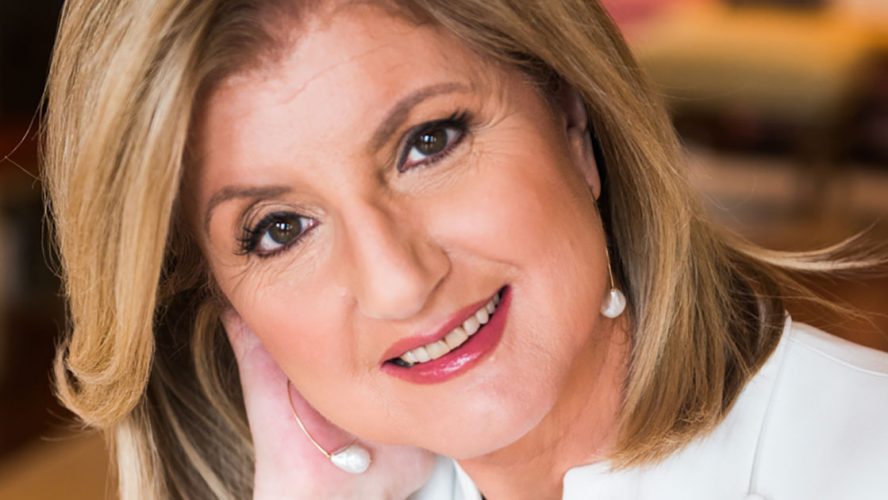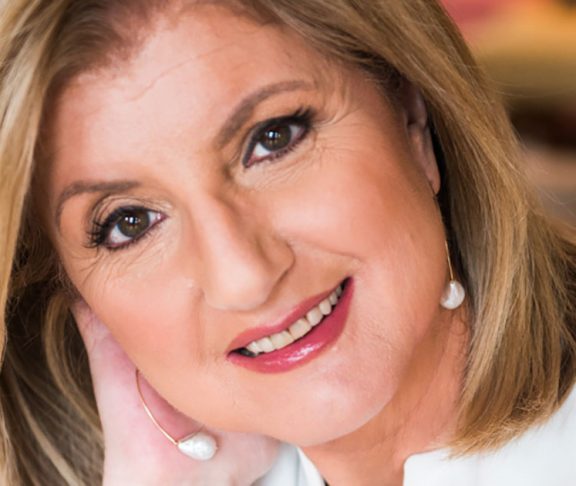Arianna Huffington is the founder of the Huffington Post, the founder and CEO of Thrive Global, and the author of 15 books, including, most recently, “Thrive and The Sleep Revolution.” In May 2005, she launched the Huffington Post, a news and blog site that quickly became one of the most widely-read, linked to, and frequently-cited media brands on the internet. In August 2016, she launched Thrive Global, a corporate and consumer well-being and productivity platform with the mission of changing the way we work and live by ending the collective delusion that burnout is the price we must pay for success.
She has been named to Time Magazine’s list of the world’s 100 most influential people and the Forbes Most Powerful Women list. Originally from Greece, she moved to England when she was 16 and graduated from Cambridge University with an M.A. in economics. At 21, she became president of the famed debating society, the Cambridge Union.
She serves on numerous boards, including Uber, Onex, The Center for Public Integrity, Global Citizen and Just Capital.
Her last two books, “Thrive: The Third Metric to Redefining Success and Creating a Life of Well-Being, Wisdom, and Wonder” and “The Sleep Revolution: Transforming Your Life, One Night at a Time,” both became instant international bestsellers.
She is a mother, sister, flat shoe advocate and sleep evangelist.
Tell us your experience as a woman in business?
Most of my career, I was self-employed writing books and articles, but like most women I’ve been on the receiving end of behaviors that contribute to an atmosphere that makes it more difficult for women to be heard – things like being called “difficult” or “driven” for voicing opinions and taking actions that would be called “bold” if a man did it. But also like most women, I carried on despite the so-called “likeability paradox.” As my mother used to say, fearlessness isn’t the absence of fear but rather the mastery of it.
What is the greatest challenge you have faced in your career?
My greatest challenge was getting out from under the collective delusion that burnout is the necessary price we have to pay for success. For much of my adult life, I accepted that — as many people still do — and in 2007 I collapsed from exhaustion and lack of sleep, hitting my head on my desk and breaking my cheekbone on the way down. Having founded the Huffington Post two years earlier, I was working 18 hours a day, seven days a week. And it was working, according to traditional measures of success. But I was not living a successful life by any truly sane definition. I was on my way up in the ways that don’t matter. And on my way down — literally — in the ways that do. I was not thriving.
How did you overcome this challenge?
My collapse was a serious wake-up call. Afterward, as I went from doctor to doctor to find out if there was any underlying medical problem, I had a chance to ask myself a lot of questions about the kind of life I was living, like, was this the life I wanted? Is this really what success looks like? So I began to make changes to the way I was living and working. I learned about the connection between well-being and productivity — and wrote two books, “Thrive” and “The Sleep Revolution” — on the topic. And as I went around the world speaking about them, I saw how deeply people want to change their lives. I decided I wanted to go beyond just speaking out and raising awareness — I felt the need to turn this passion into something real and tangible that would begin to help people make those same changes I’d made. And so I founded Thrive Global.
What advice would you give young women who are just beginning their career?
My first piece of advice would be to not buy into the idea that burnout is the price you have to pay for success. It’s not — you’ll actually be more successful if you take care of yourself and reject the idea that sleep deprivation is the way to show you’re serious about your job. And my second piece of advice would be that, given how many critics there will always be, to not add any self-criticism into the mix. This means ignoring the voice I call the obnoxious roommate living in our head — that voice that feeds on putting us down and strengthening our insecurities and doubts. We all live with that voice, but the times it comes out the most is when we’re tired, stressed and run down. That’s when we’re most likely to doubt ourselves, most likely to react emotionally, and when our perceptions are at their shakiest.
What advice would you give their supervisors?
I would say that they should be role models for showing how you can succeed without burning yourself out and make it possible for those they’re supervising to succeed in the same way. Right now, women pay the highest price for our culture of stress and burnout, in which long hours and sleep deprivation are taken as proxies for seriousness and dedication. Given that even when working women are doing the lion’s share of the work of keeping up the household, this becomes a backdoor way of excluding women or at least making it harder for them to advance. That’s one more reason why it’s so important to end this culture of burnout and change the way we work and live.

